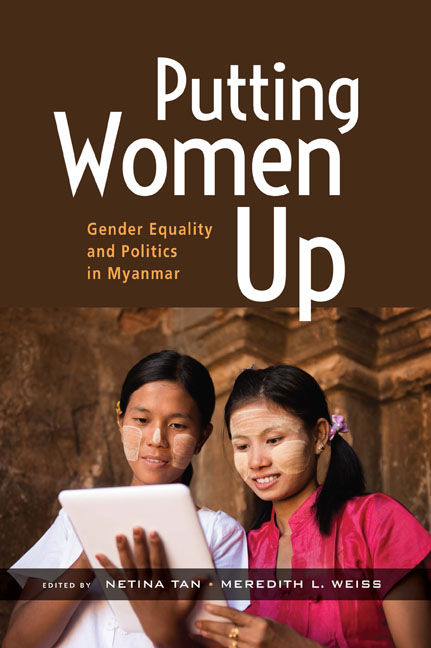Book contents
- Frontmatter
- Contents
- List of Tables
- List of Figures
- Acronyms and Glossary
- Acknowledgements
- About the Contributors
- 1 Putting Women Up: Promoting Gender Equality in Myanmar Politics
- 2 The Secret Garden of Candidate Selection and Women’s Political Participation
- 3 Ethnic Parties, Representation, and Female Candidate Recruitment in Myanmar
- 4 Attitudes Towards Women and Political Leadership
- 5 Violence, Gender, and Politics
- 6 Navigating Local Politics and Gender
- Appendix One Background of Selected Political Parties and Vote Shares
- Appendix Two Survey Questions
- Appendix Three Focus Group Guide for Field Data Collection
- Appendix Four Interview Guide Used for Field Data Collection
- Appendix Five Samples of Elite Interview Questions
- Index
Appendix One - Background of Selected Political Parties and Vote Shares
Published online by Cambridge University Press: 18 April 2024
- Frontmatter
- Contents
- List of Tables
- List of Figures
- Acronyms and Glossary
- Acknowledgements
- About the Contributors
- 1 Putting Women Up: Promoting Gender Equality in Myanmar Politics
- 2 The Secret Garden of Candidate Selection and Women’s Political Participation
- 3 Ethnic Parties, Representation, and Female Candidate Recruitment in Myanmar
- 4 Attitudes Towards Women and Political Leadership
- 5 Violence, Gender, and Politics
- 6 Navigating Local Politics and Gender
- Appendix One Background of Selected Political Parties and Vote Shares
- Appendix Two Survey Questions
- Appendix Three Focus Group Guide for Field Data Collection
- Appendix Four Interview Guide Used for Field Data Collection
- Appendix Five Samples of Elite Interview Questions
- Index
Summary
The Arakan National Party (ANP) was the product of a merger between the Rakhine National Development Party (RNDP) and the Arakan League for Democracy (ALD) and was registered with the Union Election Commission (UEC) on 6 March 2014. At the time of their founding, ANP's goals were “federalism”, “democratisation”, and “development”, but in practice the party has had a strong focus on Rakhine nationalism. Previously, the RNDP, led by Dr Aye Maung, was registered on 6 May 2010 and won a total of 32 seats in the 2010 elections. The ALD was founded in 1989 and ran in the 1990 election, winning 11 seats. The ALD re-registered with the UEC in 2012, before combining with the RNDP to form the ANP in 2014. The party claimed to have township executive committees (TECs) in 17 townships and more than 20,000 members in 2020.
Dr Manam Tu Ja, former vice president of the Kachin Independence Organization (KIO), attempted to register the Kachin State Progressive Party with the UEC for the 2010 elections. He was controversially prevented from doing so, like the other ethnic Kachin parties. He then founded the Kachin State Democracy Party (KSDP) in 2013, and, at the second attempt, on 13 January 2014. The KSDP claimed to have around 13,000 members in 2015. The KSDP was merged with three other ethnic Kachin parties to form the Kachin State People's Party.
The LNDP was registered with the UEC on 17 December 2013, with the aim of representing the Lisu people in Myanmar and promoting the development of that ethnicity. The LNDP has a close cooperative relationship with the USDP. The party claimed to have TECs in 18 townships and around 11,000 members in 2020.
The Mon Democratic Front was established in 1988 and ran in the 1990 elections, winning 5 seats. The party re-registered with the UEC after the 2010 elections, using the name the Mon Democratic Party. In 2014, the party joined with a few MPs from the All Mon Region Democracy Party and changed its name to the Mon National Party. In 2018 (overlapping the start of our field research) the MNP merged with other ethnic Mon parties to form the Mon Party.
- Type
- Chapter
- Information
- Putting Women UpGender Equality and Politics in Myanmar, pp. 167 - 172Publisher: ISEAS–Yusof Ishak InstitutePrint publication year: 2024



